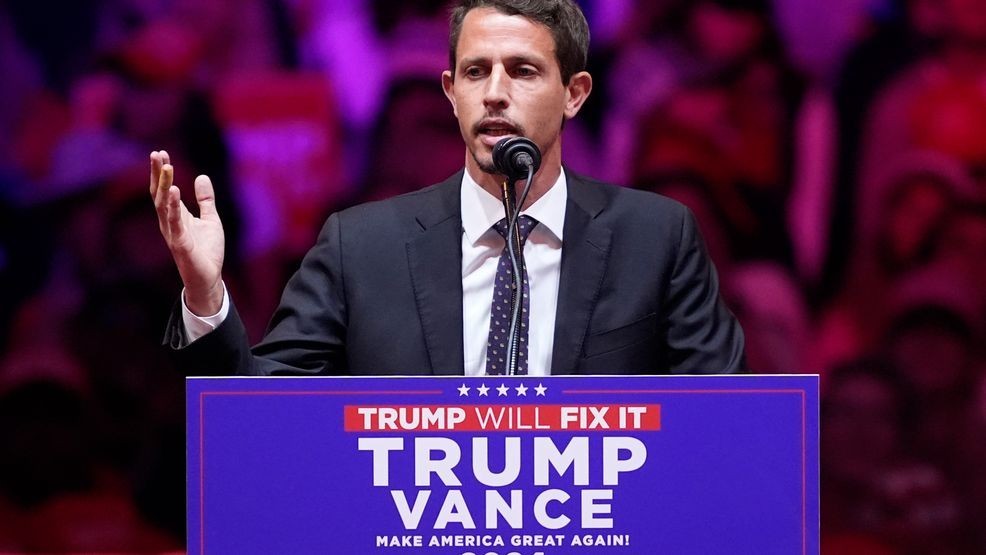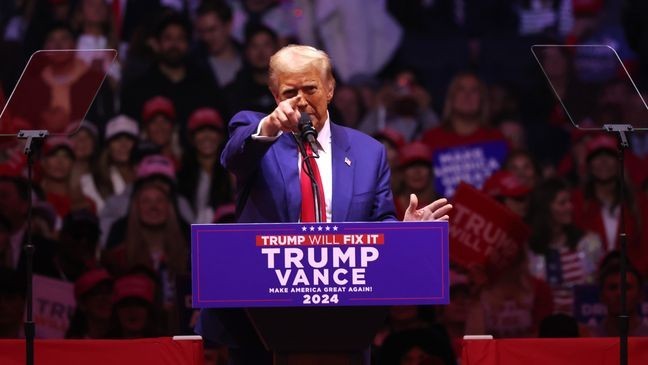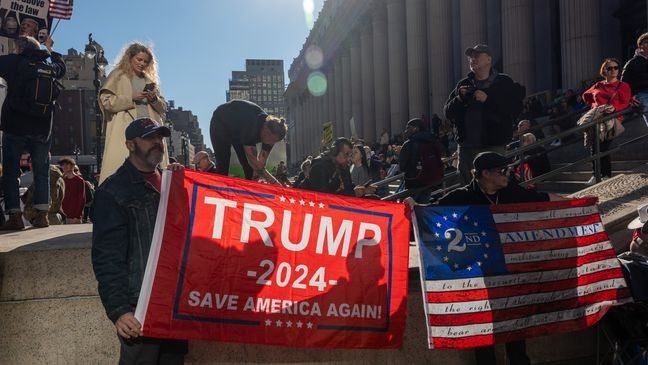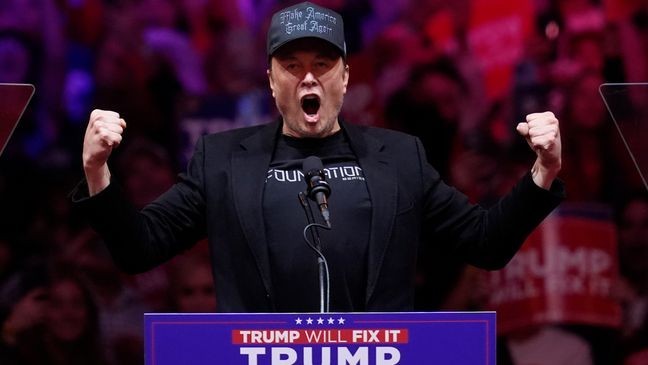Puerto Rico is not a punchline
WASHINGTON (TNND) — Donald Trump’s Sunday rally at Madison Square Garden in Manhattan was meant to be a crescendo to his 2024 presidential campaign: A blowout event on one of the world’s biggest stages to show that Trump and his supporters still have the energy and enthusiasm they need to propel the former president to a second term.
Instead, the rally drew attention for all the wrong reasons. None more than the ugliness of an amateurish joke at the expense of Puerto Rico.
Tony Hinchcliffe, who identifies as a comedian, used his invitation to entertain the MAGA masses as an opportunity to insult key constituencies the Trump campaign has fought for months to win over.
I don’t know if you guys know this, but there’s literally a floating island of garbage in the middle of the ocean right now,” said Hinchcliffe, referencing The Great Pacific Garbage Patch, before delivering the punchline “I think it’s called Puerto Rico.
The comedian also punched down at Latinos, Jews, and Black Americans in a set more reminiscent of an open mic night than a performance worthy of The Garden.
It’s not clear who inside the campaign invited Hinchcliffe, who has more than 300,000 followers on X, or if his material was vetted before the rally, but Team Trump was quick to distance itself following the disastrous set. “This joke does not reflect the views of President Trump or the campaign,” said senior adviser Danielle Alvarez in a statement.
Hinchcliffe did achieve something extraordinary with his bit: In a time of bitter partisanship, he got Democrats and Republicans to come together in condemnation of Tony Hinchcliffe.
Sen. Rick Scott, R-Fla., who is seeking reelection in red-leaning Florida, rebuffed Hinchcliffe while the rally was still in progress, posting to his X account, “This joke bombed for a reason. It’s not funny and it’s not true. Puerto Ricans are amazing people and amazing Americans!”
Gov. Tim Walz, D-Minn., the Democratic nominee for Vice President, and Rep. Alexandria Ocasio-Cortez, D-New York, addressed the joke during a livestreamed gaming session. “Who is that jackwad,” Walz asked in response to a clip of Hinchcliffe. Ocasio-Cortez, who is Puerto Rican, called it “super upsetting,” telling Walz and the stream’s viewers to “know that’s what they think about you.”
Hinchcliffe responded to Walz and Ocasio-Cortez in a tweet, writing “These people have no sense of humor,” claiming he was taken out of context to make him seem racist. He urged those reading his tweet to watch the whole set because he “made fun of everyone.”
Comedy is subjective. One person can love a joke while another person loathes it. Timing and delivery can make or break a joke. The collective groan across Madison Square Garden should have told Hinchcliffe what he does not want to concede: It wasn’t a good joke.
And it could be a costly one for the Trump campaign. Notable Puerto Ricans with large followings, including musicians Bad Bunny, Residente, Jennifer Lopez, Ricky Martin, and Luis Fonsi reacted to the joke by either endorsing Trump’s rival, Vice President Kamala Harris, or promoting a video of her plans to invest in the territory. Stateside Puerto Ricans account for large populations in New York, Florida, New Jersey, and perhaps most critically, battleground state Pennsylvania.
As Hinchcliffe claims that context is missing from the criticism of his set, perhaps it’s another context that explains why the joke particularly stings Puerto Rico: The territory has a somewhat complicated relationship with the mainland U.S.
The island was ruled by Spain for centuries until it was granted autonomy in 1897. Just one year later, the U.S. invaded during the Spanish-American war, and was awarded the island is the signing of the Treaty of Paris. That put a clamp on attempts at independence. Puerto Rico is an unincorporated U.S. commonwealth that is largely self-governed. The territory has a member in Congress, called a Resident Commissioner, who may participate in proceedings but cannot vote.
For much of the country, Puerto Rico is out of sight and out of mind. Hurricanes Irma and Maria changed that in 2017. Irma hit first in early September as a Category 5 storm, wrecking the island’s energy grid and killing three people. Its damage was estimated at $1 billion. Two weeks later, Category 4 Hurricane Maria enveloped Puerto Rico, causing river surges up to 47 feet and flooding up to 38 inches. The storm killed nearly 3,000 people on the island. FEMA estimates more than one million homes were damaged across both storms. The scars of Maria are still evident today.
Then-President Trump approved billions of dollars in federal aid for Puerto Rico, but he sparred with local politicians, saying they wasted the money. In 2021, a HUD OIG report found that the Trump Administration withheld $20 billion in hurricane relief for Puerto Rico and attempted to obstruct an investigation into the funds. Administration officials claimed the money was withheld over corruption concerns. Former acting secretary of homeland security, Elaine Duke, told the New York Times in 2020 that Trump raised the idea of selling Puerto Rico after Hurricane Maria, but that proposal was never taken seriously.
The Council on Foreign Relations calls Puerto Rico a “U.S. territory in crisis,” citing its years-long economic woes – rooted in policy – and compounded by natural disasters, the COVID-19 pandemic, and government mismanagement.
Meanwhile, a law from 1920, the Jones Act, continues to burden Puerto Ricans and other U.S. islanders, by raising the cost of shipping between ports, driving up costs of goods on residents. The Cato Institute calculates the impact at $1.4 billion every year on Puerto Rico’s economy. Many want it repealed, and question why it hasn’t been already.
There is ongoing debate over the question of statehood for Puerto Rico. Proponents argue that it would allow the island to receive billions of dollars in additional federal benefits. But the issue is also political, with Republicans in opposition because they believe statehood would ensure two additional Democratic senators and a shift of power in Congress.
Critics say Washington could do much more to support the territory.
Some wonder in what ways the U.S. benefits from the relationship. Aside from serving as a major strategic outpost in the Caribbean, Puerto Rico is critical in the pharmaceutical realm. It led U.S. exports in pharmaceuticals and medicine in 2023. Puerto Rico is also big in manufacturing and textiles, though questions persist about exploitation of labor and investment in Puerto Rican communities.
And then there’s the growing tourism industry. Puerto Rico has enjoyed record tourism revenue coming out of the pandemic, according to the island’s official destination marketing organization, Discover Puerto Rico. In 2022, tourism accounted for nearly $9 billion in revenue – a 39% increase over 2019. Visitors are drawn to its white sand beaches, inland mountains, and the pristine El Yunque National Forest. Tourism still represents only a small fraction of Puerto Rico’s GDP.
At the core of Puerto Rico is its people. They’re a proud bunch, and they’ll tell you their island’s no joke, and certainly not a punchline.




